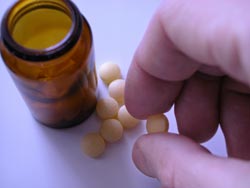Performance Nutrients
 |
Vitamins are essential to many physiological processes and should be in good supply. They play a major role in catalyzing energy production reactions from body fuel sources. For example, several B vitamins are essential to converting carbohydrates into energy which helps muscles to contract. Vitamins are also involved in tissue repair and protein synthesis. Vitamins E and C are antioxidants and protect cells from “free radicals” (toxins in the body given off by breakdown of other cells).
Part of the important functions of Vitamin C, which is heavily marketed to athletes, deals with its involvement with repairing broken down muscle tissue. Vitamin C also plays a role in iron absorption for healthy blood. It is also responsible for the formation of certain hormones and neurotransmitters that are secreted during exercise. Green peppers, oranges, grapefruit, broccoli, and cantaloupe are excellent sources of vitamin C.
Vitamin E is not only important as an antioxidant, but it also protects the integrity of the body cells. Oils such as soybean, safflower, and corn are the most common sources of vitamin E. It may also be beneficial to athletes performing in areas of high pollution due to its antioxidant effects.